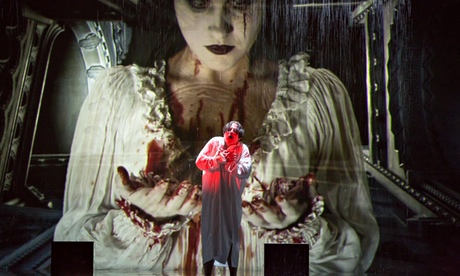
The double-bill based upon stories by Edgar Allen Poe that Debussy planned for the Met in New York is one of the most tantalising might-have-beens in 20th-century opera. He left only a few pages of sketches for The Devil in the Belfry, but continued to work on the other one-acter, The Fall of the House of Usher, almost up until his death in 1918, leaving enough musical material for several composers and scholars to have made their own completions and orchestrations of the score. The UK premiere of Robert Orledge's version made up one half of Welsh National Opera's Usher pairing, preceded by the world stage premiere of Usher House, by the billionaire composer/philanthropist Gordon Getty.
Getty has sponsored several seasons' worth of contemporary works at WNO, and putting on his hour-long opera was the price to pay for it. His treatment of the story is dull and dramatically plodding, making Poe himself (sung by Jason Bridges) the narrator but using far too many words and setting them in an unvaried declamatory style with over-emphatic orchestral punctuation like a pastiche Mussorgsky or Prokofiev. There's little sense of characterisation, even in the portrayal of Roderick Usher (Benjamin Bevan) and the sinister Doctor Primus (Kevin Short), and no sense at all of what this gothic tale of an ancient family in terminal decline is really about.
Just the opening few moments of the Debussy Usher are enough to conjure a very different and much more involving world. Orledge calculates that 52% of the score is his, much of it a scherzo-like episode that underpins one of Roderick's descriptions of his increasing dementia, and providing contrast with the more measured unfolding of much of what is authentic Debussy. But the effect is truly seamless; as conducted by Lawrence Foster, the 45-minute score sounds like late Debussy – there are echoes of the orchestral Images, especially Gigues, and even of Jeux – and the prevailing mood of a doom-laden house is recognisably similar to that of Pelléas et Mélisande.
The characters seem far more convincing than Getty's, too. Roderick Usher – a superb, despairing study by Robert Hayward – is very much the dramatic heart of things, with the doctor (Mark Le Brocq) and Usher's friend (William Dazeley) in much smaller roles, and Anna Gorbachyova as Usher's cataleptic sister Madeline having a brief introductory aria. David Pountney's staging of both works is both economical and evocative, using video projections by David Haneke, in colour for the Getty, monochrome for the Debussy, to evoke the doomy interiors of the Usher family seat, and to bring it crashing down with spectacular finality.
• At the Hippodrome, Birmingham, on Friday. Box office: 0844 338 5000.

